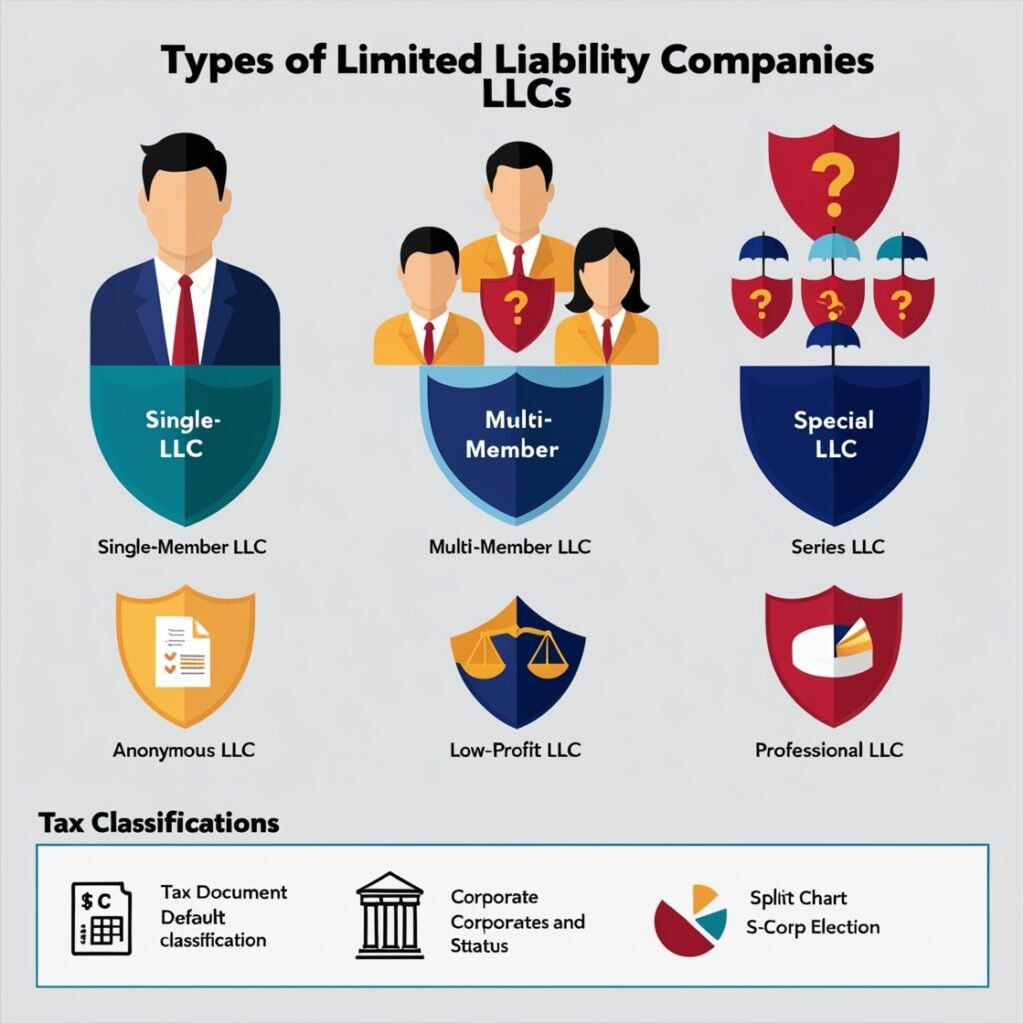Understanding Different Types of LLCs: Choosing the Best Fit

Types of LLCs: Choosing the Best Fit
When starting a business, choosing the right structure is crucial. One popular option is the Limited Liability Company (LLC). LLCs offer flexibility and protection, but it’s essential to understand the different types available to make the best decision for your business needs.
What is an LLC?
An LLC, or Limited Liability Company, is a business structure that provides personal liability protection to its owners, known as members. This means that members are not personally liable for the company’s debts and liabilities. LLCs are popular for their tax advantages and operational flexibility, making them a go-to choice for many entrepreneurs.
Types of LLCs
Single-Member LLC
A Single-Member LLC (SMLLC) has one owner. It combines corporate protection with the simplicity of a sole proprietorship. Here’s what you need to know about an SMLLC:
- It’s considered a disregarded entity for tax purposes, meaning the IRS does not recognize it as separate from its owner.
- The owner reports profits and losses on their personal tax return.
- It offers liability protection similar to that of a corporation.
- It’s great for solo entrepreneurs who want a straightforward business structure.
Multi-Member LLC
A Multi-Member LLC (MMLLC) has two or more owners. It shares many benefits with a Single-Member LLC but includes additional complexity in terms of structure and management. Key points about MMLLC:
- It’s considered a partnership for tax purposes, unless it elects to be taxed as a corporation.
- Members share profits and losses, reported on individual tax returns via Schedule K-1.
- It allows for distribution of management responsibilities among members.
- It’s an excellent choice for small businesses with multiple owners.
Member-Managed LLC vs. Manager-Managed LLC
When setting up an LLC, you must decide if it will be member-managed or manager-managed:
Member-Managed LLC
In a member-managed LLC, all members actively participate in the day-to-day operations of the business. This structure is common for small LLCs or family-run businesses.
Manager-Managed LLC
In a manager-managed LLC, the members appoint one or more managers to handle the operations while they act as passive investors. This structure is beneficial for larger businesses or those with investors who don’t want to be involved in daily management.
Special Types of LLCs
Series LLC
A Series LLC allows a parent LLC to form multiple subsidiary LLCs, known as series. Each series operates independently, providing liability protection across different business ventures. The series LLC structure is ideal for businesses with distinct lines of operation, real estate investors managing multiple properties, or serial entrepreneurs.
Anonymous LLC
An Anonymous LLC is designed to keep the member(s) identities private. This LLC is formed in states that do not require public disclosure of members’ names. It’s suitable for individuals or companies valuing confidentiality in their business dealings.
L3C (Low-Profit Limited Liability Company)
An L3C blends the legal structure of an LLC with nonprofit principles. It’s designed for businesses aiming to achieve a social benefit while operating for profit. Ideal for social enterprises, L3Cs allow business leaders to attract investment while pursuing charitable missions.
Professional LLC (PLLC)
PLLCs are tailored for licensed professionals, such as doctors, lawyers, or architects. They combine the standard LLC’s tax and liability benefits while adhering to regulations in industries requiring professional licensure. PLLCs ensure that only qualified professionals are members.
Tax Classifications for LLCs
Default Classification
By default, a Single-Member LLC is taxed as a sole proprietorship, and a Multi-Member LLC is taxed as a partnership. This means:
- Profits and losses pass through to members’ personal tax returns.
- The LLC itself does not pay federal income tax.
- The process involves simple tax filing and bookkeeping.
Electing Corporate Status
LLCs can choose to be taxed as a corporation by filing IRS Form 8832. This offers potential tax benefits, such as:
- The ability to pay salaries to members, reducing self-employment taxes.
- Profits can be retained within the business to avoid double taxation.
S-Corp Election
LLCs may also elect to be taxed as an S-Corporation by submitting IRS Form 2553. This provides additional tax benefits, including:
- Distributions to members not subject to self-employment tax.
- Potentially lower overall tax liability due to salary and distribution split.
Choosing the Best LLC Structure for Your Business
When deciding which type of LLC is best for your business, consider the following factors:
- Number of Owners: Single- or multi-owner structure will influence your LLC type.
- Management Style: Decide if you want active involvement or prefer appointing managers.
- Business Complexity: Series LLCs and other special types offer more complex structures for varied needs.
- Tax Implications: Understand tax classification options to choose the most beneficial setup.
- State Regulations: Check your state’s requirements and allowances for LLC types and privacy options.
Consulting with a legal or financial advisor can also help ensure you choose the best LLC structure tailored to your business goals.
Conclusion
Understanding the different types of LLCs and their benefits is essential for making an informed decision about your business structure. Whether you’re a solo entrepreneur or running a complex enterprise, there’s an LLC type designed to fit your needs. Assess your business requirements, consider the tax implications, and choose the structure that offers the most advantages to help your business thrive.




3 Responses